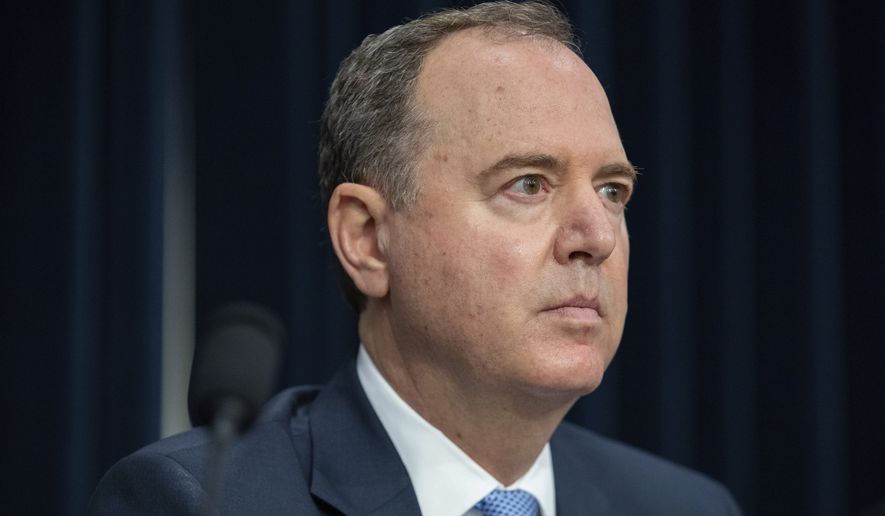House Intelligence Committee Chairman Adam Schiff argued Sunday that the indictment of former Trump White House adviser Steven K. Bannon will force others to cooperate with Congress’ probe into the Jan. 6 riot.
Mr. Schiff, a California Democrat, told NBC’s “Meet the Press” said the indictment showed GOP officials and allies of former President Donald Trump the “reestablishment of the rule of law in this country.”
“Even before the Justice Department acted, it influenced other witnesses,” said Mr. Schiff. “Now that witnesses see that if they don’t cooperate, if they don’t fulfill their lawful duty when subpoenaed, that they, too, may be prosecuted, it will have a very strong, focusing effect on their decision making.”
Mr. Bannon was indicted last week by a federal grand jury on two counts of contempt of Congress after failing to comply with a subpoena from the House panel investigating the Jan. 6 attack on the U.S. Capitol.
He faces a minimum of 30 days and a maximum of one year in jail for each count if found guilty. Attorney General Merrick Garland said his prosecutors were delivering justice.
“Since my first day in office, I have promised Justice Department employees that together we would show the American people by word and deed that the department adheres to the rule of law, follows the facts and the law and pursues equal justice under the law,” he said in a statement. “Today’s charges reflect the department’s steadfast commitment to these principles.”
The indictment follows a vote last month by the Democratic-run House recommending criminal contempt charges after Mr. Bannon failed to comply with the panel’s subpoena demanding he produce documents and appear for a scheduled deposition.
Mr. Bannon was charged with one count of contempt for failing to appear before the panel for questioning and another for refusing to produce documents.
Lawmakers on the House Select Committee say Mr. Bannon was in communication with then-President Trump in the lead-up to the Jan. 6 protests and made statements that they say indicate his foreknowledge of the riot.
Mr. Bannon’s lawyer, Robert Costello, sent a letter to the committee before the scheduled deposition saying his client would not participate in the investigation, citing the former president’s assertion of executive privilege. He said that the issue of executive privilege had yet to be ironed out by the committee.
CNN, however, reported that Mr. Bannon “is expected to self-surrender on Monday and appear in court Monday afternoon, according to a source familiar with the matter.”
In response, Committee Chairman Bennie G. Thompson, Mississippi Democrat, said the former president’s claim of privilege had not been communicated to the committee and did not absolve Mr. Bannon from participating.
Mr. Trump has sued federal officials over the release of documents related to the Jan. 6 probe. His legal team said in the lawsuit that the House committee has “no legitimate legislative purpose” for its request. They also press the claim that, as a former president, Mr. Trump enjoys “inherent constitutional rights of privilege.”
The committee argued Mr. Trump’s claim of executive privilege, even if valid, would not apply to Mr. Bannon, who left the administration in 2017. They said his failure to appear for the scheduled deposition amounts to criminal contempt. The panel voted unanimously to refer charges to the Justice Department.
“The former president’s clear objective is to stop the Select Committee from getting to the facts about January 6th and his lawsuit is nothing more than an attempt to delay and obstruct our probe,” said Mr. Thompson and Rep. Liz Cheney, Wyoming Republican and the panel co-chair, in a statement after the vote.
Mr. Thompson and Ms. Cheney said in a statement Friday that Mr. Bannon’s indictment “should send a clear message to anyone who thinks they can ignore the Select Committee or stonewall our investigation.”
“We will not hesitate to use the tools at our disposal to get the information we need,” the lawmakers said.
But the indictment comes as other witnesses defy the committee’s demands and cite the former president’s claims of executive privilege.
Earlier Friday, former Trump White House Chief of Staff Mark Meadows failed to appear for a scheduled deposition. Last week, former Trump Department of Justice official Jeffrey Clark refused to answer questions while appearing before the committee. Both cited Mr. Trump’s pending lawsuit as justification for not cooperating.
Mr. Thompson dismissed Messrs. Meadows and Clark’s claims outright and warned that the committee is prepared to seek criminal contempt charges for their refusals.
Mr. Trump’s initial request for an injunction to halt the National Archive’s release of White House records to the committee was denied by U.S. District Court Judge Tanya Chutkan last Tuesday. A federal appeals court on Thursday granted Mr. Trump’s emergency motion to pause the release as the Trump legal team appeals the decision.
• Haris Alic can be reached at halic@washingtontimes.com.
• Joseph Clark can be reached at jclark@washingtontimes.com.




Please read our comment policy before commenting.